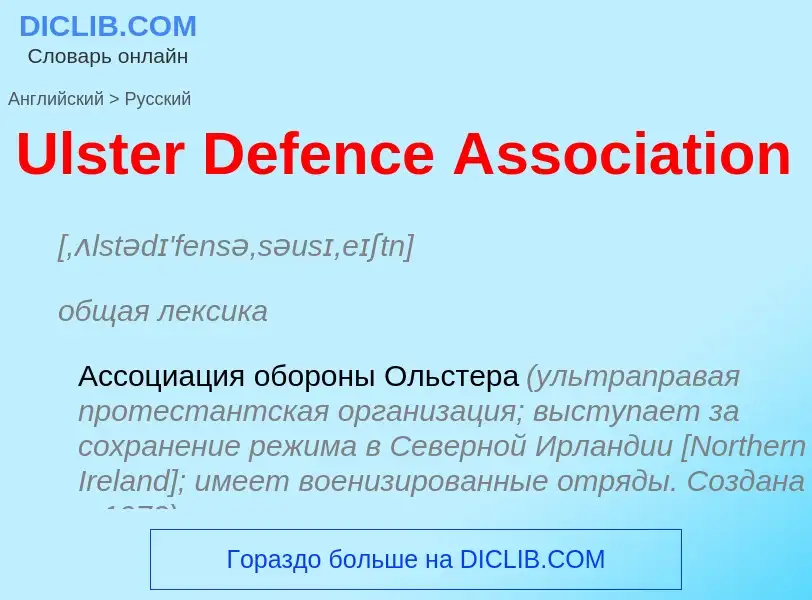Traduzione e analisi delle parole tramite l'intelligenza artificiale ChatGPT
In questa pagina puoi ottenere un'analisi dettagliata di una parola o frase, prodotta utilizzando la migliore tecnologia di intelligenza artificiale fino ad oggi:
- come viene usata la parola
- frequenza di utilizzo
- è usato più spesso nel discorso orale o scritto
- opzioni di traduzione delle parole
- esempi di utilizzo (varie frasi con traduzione)
- etimologia
Ulster Defence Association - traduzione in russo
[,ʌlstədɪ'fensə,səusɪ,eɪʃtn]
общая лексика
Ассоциация обороны Ольстера (ультраправая протестантская организация; выступает за сохранение режима в Северной Ирландии [Northern Ireland]; имеет военизированные отряды. Создана в 1972)
[,ʌlstədɪ'fens,redʒɪmənt]
общая лексика
полк обороны Ольстера (запасной из местных добровольцев в Северной Ирландии [Northern Ireland]; работает в тесном контакте с британской армией и с королевскими констеблями Ольстера [Royal Ulster Constabulary]. Образован в 1969)
[,ju:di:'eɪ]
сокращение
от Ulster Defence Association
Definizione
Wikipedia
The Ulster Defence Association (UDA) is an Ulster loyalist paramilitary group in Northern Ireland. It was formed in September 1971 as an umbrella group for various loyalist groups and undertook an armed campaign of almost 24 years as one of the participants of the Troubles. Its declared goal was to defend Ulster Protestant loyalist areas and to combat Irish republicanism, particularly the Provisional Irish Republican Army (IRA). In the 1970s, uniformed UDA members openly patrolled these areas armed with batons and held large marches and rallies. Within the UDA was a group tasked with launching paramilitary attacks that used the cover name Ulster Freedom Fighters (UFF) so that the UDA would not be outlawed. The British government proscribed the UFF as a terrorist group in November 1973, but the UDA itself was not proscribed until August 1992.
The UDA/UFF were responsible for more than 400 deaths. The vast majority of its victims were Irish Catholic civilians, killed at random, in what the group called retaliation for IRA actions or attacks on Protestants. High-profile attacks carried out by the group include the Top of the Hill bar shooting, the Milltown massacre, the Sean Graham's and James Murray's bookmakers' shootings, the Castlerock killings, killings of Paddy Wilson and Irene Andrews and the Greysteel massacre. Most of its attacks were in Northern Ireland, but from 1972 onward it also carried out bombings in the Republic of Ireland. The UDA/UFF declared a ceasefire in 1994 and ended its campaign in 2007, but some of its members have continued to engage in violence. The other main Loyalist paramilitary group during the conflict was the Ulster Volunteer Force (UVF). All three groups are proscribed organisations in the United Kingdom under the Terrorism Act 2000.






![UDR march past at Mahon Road Barracks, [[Portadown]] UDR march past at Mahon Road Barracks, [[Portadown]]](https://commons.wikimedia.org/wiki/Special:FilePath/11 UDR March Past.jpg?width=200)
![The [[Royal Irish Rangers]] in various forms of dress. The [[Royal Irish Rangers]] in various forms of dress.](https://commons.wikimedia.org/wiki/Special:FilePath/Irish Ranger.jpg?width=200)
![AAC]] Lynx helicopter used to support the UDR AAC]] Lynx helicopter used to support the UDR](https://commons.wikimedia.org/wiki/Special:FilePath/Lynx Hubschrauber IFOR.jpg?width=200)

![[[Shorland armoured car]] used by the UDR [[Shorland armoured car]] used by the UDR](https://commons.wikimedia.org/wiki/Special:FilePath/Shorland armoured car mk1.jpg?width=200)
![C Company, 1 UDR on parade at Steeple Camp, [[County Antrim]], [[Remembrance Sunday]] 1970 C Company, 1 UDR on parade at Steeple Camp, [[County Antrim]], [[Remembrance Sunday]] 1970](https://commons.wikimedia.org/wiki/Special:FilePath/Soldiers of 1 UDR on parade at Steeple Camp, Antrim.jpg?width=200)




![Soldiers of 11 UDR on a patrol break in the South Armagh area. The soldier on the right is carrying a jamming device to prevent the detonation of radio-controlled [[improvised explosive device]]s. Soldiers of 11 UDR on a patrol break in the South Armagh area. The soldier on the right is carrying a jamming device to prevent the detonation of radio-controlled [[improvised explosive device]]s.](https://commons.wikimedia.org/wiki/Special:FilePath/UDR Soldiers - South Armagh.jpg?width=200)











![Memorial seat]] at the National Arboretum. Memorial seat]] at the National Arboretum.](https://commons.wikimedia.org/wiki/Special:FilePath/UDR Memorial Seat - National Arboretum.jpg?width=200)
